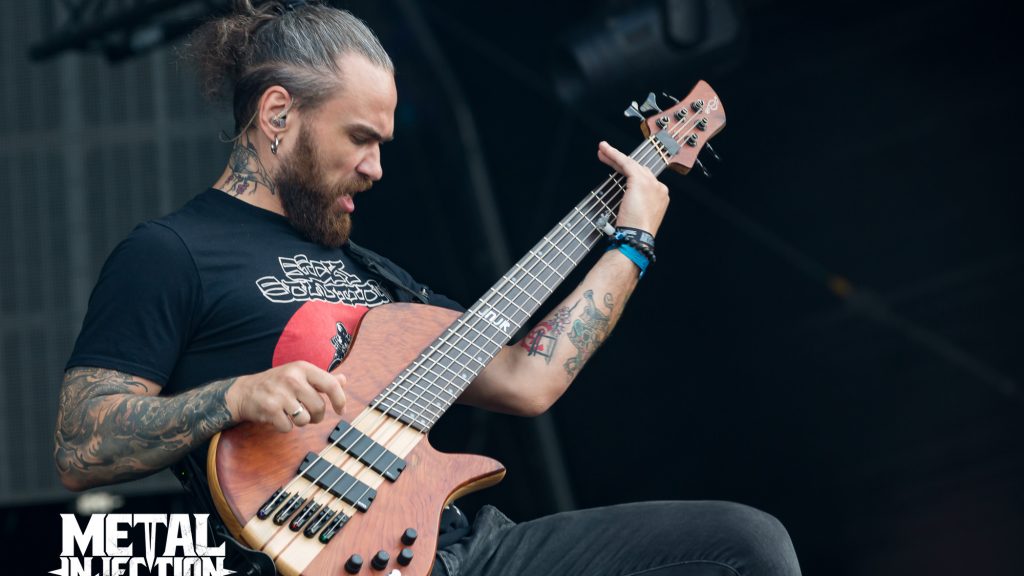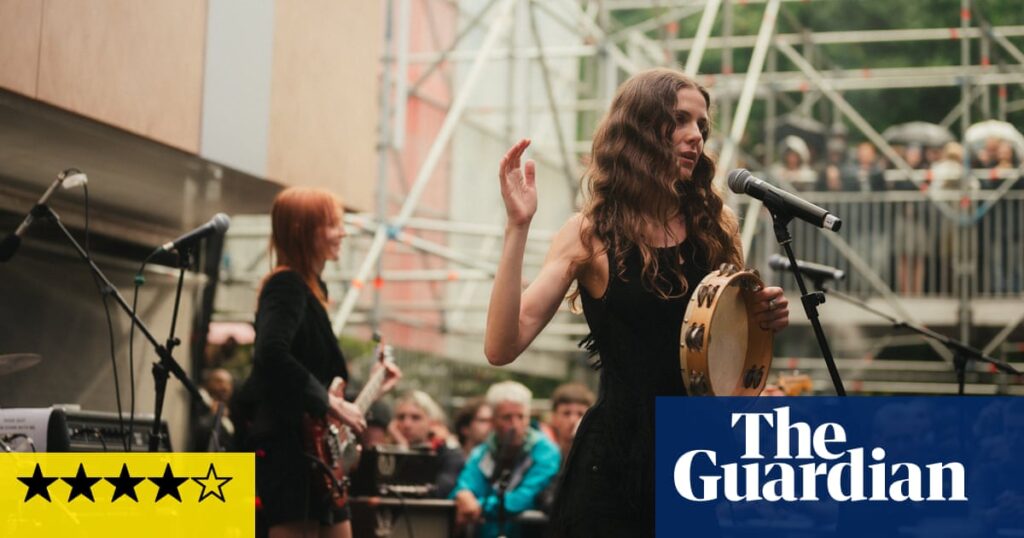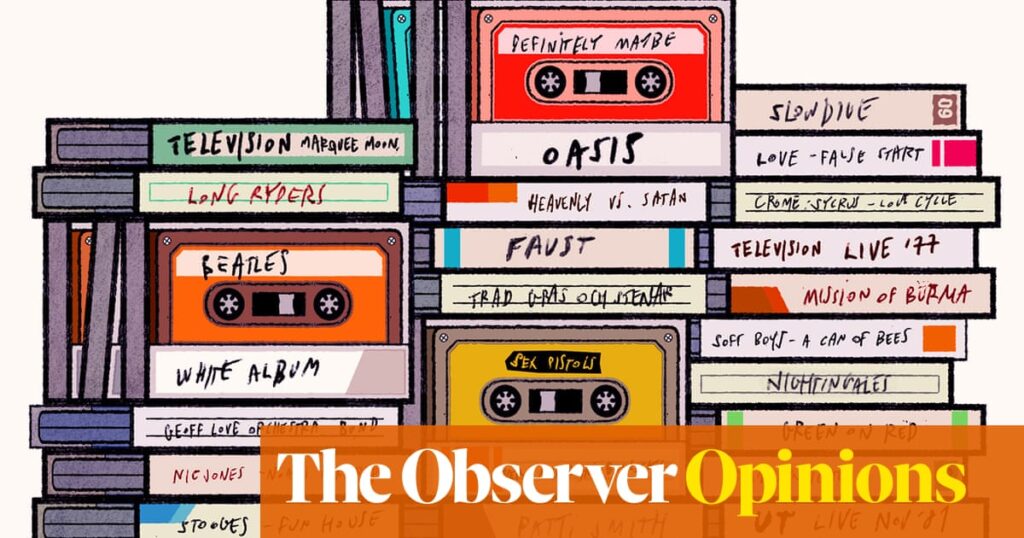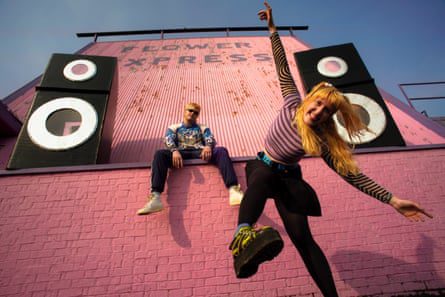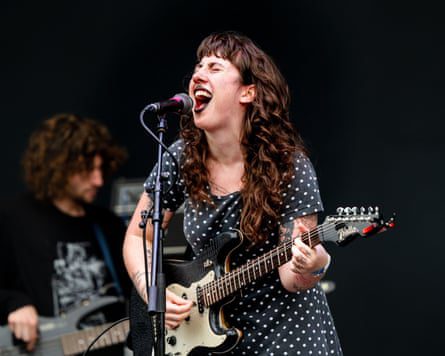
Arson, sex shops, livestreamed funerals: Wednesday’s Karly Hartzman on the wild stories in her southern gothic rock
To step into Karly Hartzman’s home is to see the contents of her brain shaken out. There is a fireplace mantel covered in dolls and figurines; a wooden rack filled with cassette tapes; an old doll’s house filled to the brim with fabric scraps; a few overflowing bookshelves. As the 28-year-old leader of the indie-rock band Wednesday greets me at the door, she realises a few new additions have just landed through the letterbox, some books about the history of hardcore and punk: she has been listening to both a lot and is eager to educate herself.
Hartzman is a collector by nature, a habit that is also at the heart of her songwriting. Equally inspired by the southern rockers Drive-By Truckers and the shoegaze greats Swirlies, Wednesday’s sound combines heartfelt twang with walls of pummelling sound. Hartzman’s lyrics are highly narrative, inflected with striking, gnarly details. Listen to the band’s breakthrough album, 2023’s Rat Saw God, and you will hear about urine-coloured soda, roadside sex shops, accidental arson and teens getting high on Benadryl.
The band’s forthcoming sixth album, Bleeds, refines their sound, never letting the raw noise overshadow Hartzman’s knack for melody and unique stories. “This is what we’ve been working towards this whole time,” she says. She calls the band’s singular sound an “unavoidable” result of the members’ individual tastes. By now, she says: “We know what a Wednesday record sounds like, and then we make it.”
Although Pitchfork declared Wednesday “one of the best indie-rock bands around”, Hartzman keeps a low profile in her home town, the small North Carolina city of Greensboro. She recently moved back from nearby Asheville, where she lived on a bucolic property known as Haw Creek that was home to various local musicians. In person, Hartzman is thoughtful, expressive and more reserved than you might expect from her riotous performances.
As we drive around Greensboro, she points out her teenage haunts, such as the cafe she used to frequent when she skipped school. As a kid, she resented being told what to do, but never let that get in the way of an education. “I was very methodical,” she says about cutting class. “I was writing and reading and doing work – I was doing my own school, on my terms.”
She credits her taste in music to a few crucial sources: her parents, who played Counting Crows and the singer-songwriter Edwin McCain around the house; her older sister, who got her into Warped tour punk (Paramore were an early favourite); and a longtime friend who introduced her to shoegaze and post-hardcore bands such as My Bloody Valentine and Unwound.
When she started college, Hartzman admired her friends who played in bands, but she wasn’t interested in taking music lessons. Then she saw the band Palberta – a playful indie-rock trio whose members traded instruments every few songs – and felt inspired by the messy, uncomplicated style of playing the three women shared. “They were doing something that sounded awesome and very easy,” she says. “After that show, I bought my friend’s guitar off him.”
Hartzman’s earliest recordings were solo; she got a formal band together only when her sister asked her to perform at her birthday party. From there, Wednesday rotated through a few members before settling into a stable lineup: Xandy Chelmis on steel guitar, Ethan Baechtold on bass and piano, Alan Miller on drums and MJ Lenderman on guitar. They started playing house shows and tiny spots with friends’ bands and folks they met in local DIY scenes.
Wednesday’s shows could be raucous, rowdy affairs, but their home lives centred around the quietude of Haw Creek, surrounded by streams and open fields – the kind of place where they could go fishing in the morning, then practice in the living room later on. “We lived on acres of land,” she says. “Nothing will ever beat that.”
Hartzman lived at Haw Creek with Lenderman who, alongside his work in Wednesday, found meteoric success last year for his fourth solo album, Manning Fireworks. He and Hartzman started dating before Lenderman joined Wednesday – Hartzman was a fan of his music, playing it over the speakers at the coffee shop where she worked before they met.
After six years together, they broke up amicably in 2024. Hartzman chalks it up to the usual big-picture differences that emerge in adulthood. In your early 20s, she says: “You’re just like: ‘Oh, I like this person, I’ll date them.’ But then, when you’re 28, you have to be like: ‘Does this person have the same intentions in life?’” Hartzman was interested in marriage and kids; Lenderman was not quite on the same page, she says. But, from the beginning, “I’ve known, even if we’re not romantic for ever, we’re creative collaborators for ever”. Lenderman will be on future records; while he won’t perform on their next tour, Hartzman insists it’s nothing personal; between Wednesday and his solo career, his touring schedule has been relentless and “he needs a break”.
The songs on Bleeds were written before the breakup, although some of them hint at the deteriorating relationship. The Way Love Goes started as an apology for not being fully present. “When I wrote it, I was like: ‘But I’m gonna fight for this,’” she says. “Of course, by the time we recorded it, that was not the situation.” Wasp, meanwhile, describes the bitter self-recrimination she felt towards the relationship’s end. “My body just kind of gave up on me,” she says. “I was really dissociated because I didn’t want to break up, but I was having to accept that we needed to.”

Bleeds is haunted by images of loss and violence: a washed-up body, a livestreamed funeral, a car crash, a knife fight. Hartzman doesn’t see it necessarily as a dark record; she sees it as chasing good stories and telling the truth. “Death is around at every point,” she says. “If you don’t acknowledge that, you’re lying.” She is drawn to mixing the cartoonish and the creepy: “I think that’s just a southern gothic attitude,” she says, describing her taste as “a little bit scary, but there’s a heart of gold underneath”.
Much of Hartzman’s songwriting draws on her memories of youthful debauchery, like sneaking out late then teaching Sunday school. She is also a keen collector of stories, keeping an eye out for strange characters and unbelievable happenings. “If someone has a story where they’re, like: ‘Oh my God, this was so embarrassing,’ or: ‘This is kind of a secret,’” her ears prick up. (She always asks for permission and changes names and identifying details to protect the innocent.) From Bleeds, the drowning victim on Wound Up Here (By Holdin’ On) comes from a friend’s story from his days as a rafting guide in West Virginia; Carolina Murder Suicide was inspired by a true-crime podcast. But Hartzman’s songs still feel intimate, told in first person through a singular lens, treating their subjects with compassion.
Rat Saw God took the band to new heights, landing on many publications’ year-end lists. But as she looks towards the release of Bleeds, Hartzman is committed to keeping her personal life steady. It helps that while “the shows have changed a lot” – getting bigger and bigger – “my life at home has been so consistent”. This year, she ditched her smartphone, got off social media and built herself a charmingly retro, Y2K-style personal website. The apps were zapping her focus; then, a profile of Lenderman was published with details of their breakup. “People were putting their own two cents on that shit,” she says with an eye roll. “I was like: oh, it would feel so good to get off that.” She has changed how she listens to music, too, jettisoning the algorithm to favour recommendations from friends and blogs. “It’s been so rewarding.”
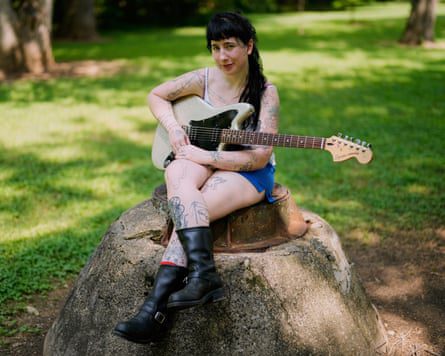
On her site, she shares monthly journal entries and roundups of the music and media she is enjoying. She answers reader-submitted questions about everything from learning guitar to her relationship with religion.
She also has a PO box where listeners can send letters; she replies to as many as she can. It’s important for her to be in touch with the people who love her music, she says, and she wants to give them something special. But this method represents, for her, a “closeness on my own terms” – a way of preventing the always-on burnout faced by many musicians on the rise. Her ability to tune out industry pressure surprises even those closest to her. Lenderman “is always wondering: ‘How do you not feel that kind of pressure of expectation?’” she says. “But my need to write is so important to me, more than any reception.”
As well as making her own merch from customised thrift store T-shirts, in her precious downtime, Hartzman has been writing and spending time with local friends – they are fond of a laundromat-cum-bar called Suds & Duds. She has never lived outside North Carolina – and doesn’t plan to. “I love it,” she says. “It feels like home to me. And that feeling is addicting.” Folks here know her face because they watched her grow up, or grew up alongside her, not because her band recently played The Late Show (although she did get recognised recently by a Wednesday listener at her grandmother’s retirement home).
Most of what happens in her songs “could happen anywhere”, she says. “I’m not trying to say, necessarily, that I had a different upbringing or lifestyle than most teenagers.” But she is telling her story truthfully – “and, in reality, it happened here”.
Hartzman understands why other artists might move to a major city to find artistic success, but she is glad to be rooted in such a distinctive place. “I don’t like the feeling of: ‘I’m in the cultural centre of the universe and what I do here will pervade the rest of culture,’” she says with a shrug. “I like the idea of coming in from the edge.”

